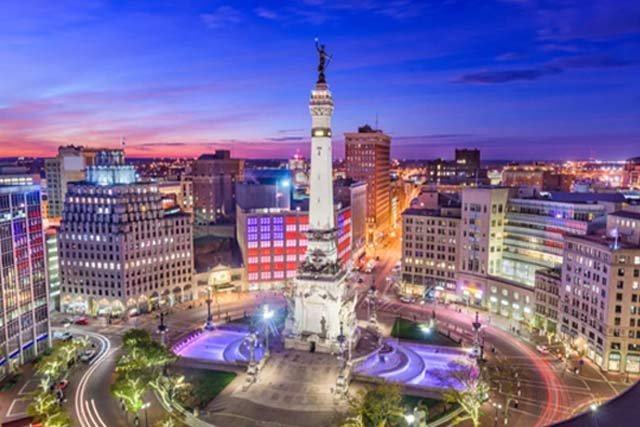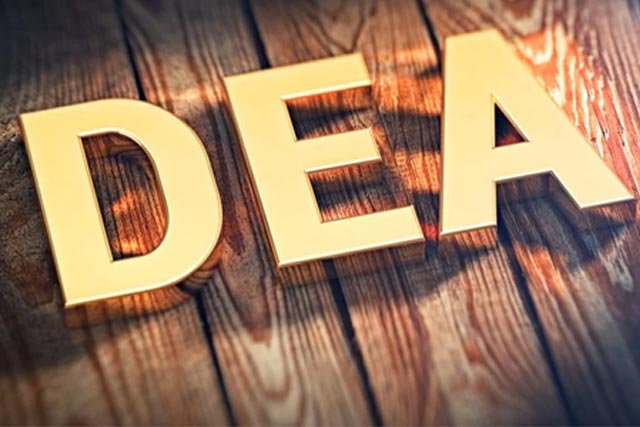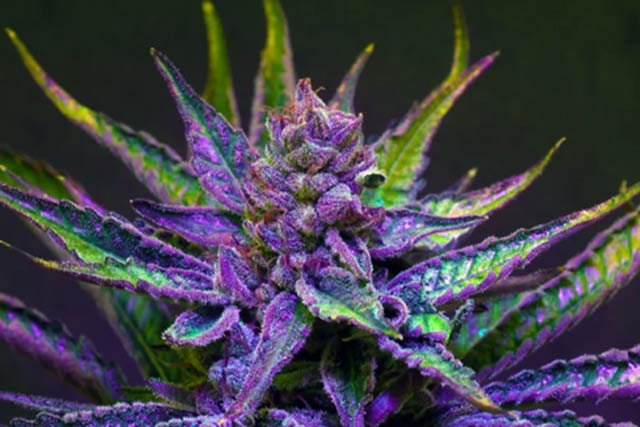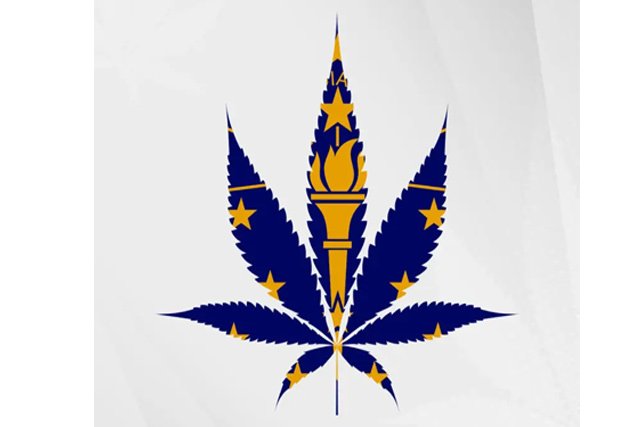The emergence of delta-8-THC (delta-8) products across the US has been great for marijuana lovers in states that are yet to legalize. But some states are not so keen on delta-8 and have banned the newly popular legal high. Is Delta-8 legal in Indiana, except for smokable delta-8 hemp flower. The 2018 Farm Bill legalized all derivatives of hemp, including delta-8. The Indiana Legislature passed a law with the same wording but banned smokable hemp in 2019. The Indiana House voted to reverse the ban in early 2022, but the Senate has yet to vote.

The legalization of delta-8 in Indiana isn’t without controversy! I’m here to guide you through why delta-8 is legal and why some argue that it shouldn’t. I’ll also discuss the future of delta-8 products in the Hoosier State.
1. Delta-8 State Law in Indiana
It’s somewhat surprising that delta-8 products are legal in Indiana, given the state hasn’t even legalized medical marijuana, let alone recreational pot. But with delta-8 allowed, as of October 2022, marijuana is essentially legal in Indiana!
The relaxation of hemp laws explains everything. Over the past few years, industrial hemp has become a major cash crop in Indiana and elsewhere. In 2018, the Indiana Legislature passed Senate Bill 52 (SB 52), legalizing “low-THC hemp extract.”
The bill defined low-THC hemp extract as a product derived from the Cannabis Sativa L. plant that meets the definition of industrial hemp and contains less than 0.3% delta-9-THC.
The necessary industrial hemp definition is found in Indiana Code Title 15. Agriculture and Animals § 15-15-13-6. The law code states that all derivatives of the hemp plant are legal, including cannabinoids, which cover delta-8.
Therefore, even though delta-8 has psychoactive properties, this doesn’t affect its legal status according to Indiana state law. THC is the only natural cannabinoid that lawmakers restricted when drawing up hemp legislation.
2. Delta-8 and the Federal Law
The federal government first legalized industrial hemp in the 2014 Farm Bill. But delta-8 products only started appearing after the passage of the 2018 version.
The 2018 Farm Bill confirmed and clarified that hemp-derived cannabinoids were legal and should no longer be treated as Schedule 1 substances under the Controlled Substances Act.
However, this broad legalization was more about giving the go-ahead to the flourishing hemp-based cannabidiol (CBD) industry. But by legalizing all hemp derivatives and only restricting THC, the Farm Bill gave the all-clear to hemp-based products rich in delta-8.
In reality, delta-8 and THC are very similar in a molecular sense and have similar properties. If you have tried both, perhaps you’ll agree that delta-8 has milder effects than THC. But ultimately, both will get you high!
2.1 Federal Law
Therefore, the federal government’s legalization of delta-8 can only be considered an accident. While marijuana is still classified alongside heroin and meth as a Schedule 1 substance, you’ll find delta-8 being legally sold online and in brick-and-mortar stores across the US.
But without wanting to defend the government, it was an easy mistake to make! Delta-8 wasn’t on anyone’s radar until the 2018 Farm Bill created a legal loophole. The cannabinoid may be naturally occurring in hemp, but since plants typically contain less than 0.1% delta-8, few thought it could be useful for anything.
Indeed, naturally sourced delta-8 is mostly useless. Making delta-8 products through hemp plant extractions alone would be extremely costly. Nobody would buy delta-8 edibles costing hundreds of dollars – not even the biggest weed enthusiasts!
Hemp companies solved this problem by harnessing isomerization, although not without controversy. Isomerization is natural, but companies have perfected the laboratory technique to increase delta-8 production.
Many have questioned if this method of making delta-8 is legal. The Farm Bill was about legalizing natural hemp products rather than allowing businesses to manufacture legal hemp-based highs. But that doesn’t necessarily mean delta-8 should be illegal.
The law is clear: all hemp-derived cannabinoids (except for delta-9-THC) are legal in any concentration, including delta-8. The Farm Bill says nothing about whether a compound is psychoactive; nor did it impose restrictions on how products can be made.
3. How the DEA views Delta-8

The Drug Enforcement Administration (DEA) is the federal agency that determines a substance’s legal status. The DEA hasn’t called out delta-8 products directly, but many thought an Interim Final Rule (IFR) published in 2020 targeted the industry.
The IFR was supposed to clarify and address any confusion related to the Farm Bill. Regarding delta-8, the crucial clarification was that “synthetically derived tetrahydrocannabinol” is still a scheduled substance, no matter how much delta-9-THC it contains.
But there are disagreements in the hemp scene over whether the delta-8 products available right now are synthetically derived or not.
True, these products undergo lab processing. But the process entails turning CBD into delta-8 through isomerization – which is natural and doesn’t involve synthetic compounds.
Furthermore, the term “synthetic tetrahydrocannabinol” applies much more to spice (K2) and scandalous synthetic marijuana products than it does delta-8.
Synthetic cannabinoids are a cheaper and entirely man-made alternative to marijuana. But unlike natural cannabis, synthetic weed is very dangerous and has been linked to fatalities. Synthetic cannabinoids are more potent and more addictive than THC and other tetrahydrocannabinol.
If you’re the DEA, these products are a bigger problem now than delta-8. Not only is spice more harmful than delta-8, but it also simply fits the synthetic tetrahydrocannabinol description better.
In my view, if the DEA wanted to shut down delta-8 with the IFR, it could have done so by capping all tetrahydrocannabinol at 0.3%, not just delta-9-THC. By targeting synthetic compounds specifically, I think they were going after spice.
That said, I can’t imagine the DEA is delighted about the emergence of delta-8. The agency could try making delta-8 and other tetrahydrocannabinol-scheduled substances in the future. But until then, delta-8 lovers in Indiana and beyond should rest easy.
4. History of Delta-8 in Indiana
Scientists first learned about delta-8 in 1941, and we can presume that it was present in marijuana long before then. Indiana first began implementing restrictions on marijuana in 1913, when it prohibited the sale of pot without a prescription.
The federal government began regulating marijuana in 1937 with the passage of the Marihuana Tax Act. When the Controlled Substances Act became effective in May 1971, delta-8 was classified as a Schedule 1 drug, where it stayed until 2018.
With the 2018 Agriculture Improvement Act, delta-8 sourced from hemp became legal across the US. The Indiana Legislature confirmed the change in 2018 with SB 52.
In 2019, Indiana made smokable hemp products illegal with Senate-Enrolled Act 516 (SEA 516). The act criminalized all smokable hemp, including both CBD and delta-8 flower. However, the House of Representatives voted to repeal the ban in March 2022, passing House Bill 1224. The Senate must now vote on the bill.
As of October 2022, Indiana lawmakers have not passed legislation prohibiting delta-8. However, Banks & Brower LLC, a law firm operating in the state, has suggested that some brands may be selling illegal delta-8 products that do not conform with the 0.3% delta-9-THC limit.
5. Buying and Selling Delta-8 in Indiana
You have to be a little careful when buying delta-8 products in Indiana. Because the Food and Drug Administration (FDA) does not regulate the hemp industry, you don’t always know what you’re getting.
The unregulated, Wild West-type market allows scammers to sell low-grade or even fake delta-8 products to unsuspecting customers like you. Fake products could merely be ineffective, but they can also be dangerous.
The vape scene was rocked in late 2019 by several illnesses and deaths linked to illegal vape juices made with vitamin E acetate. This incident highlighted how important it is to only buy from legit vendors.
Thankfully, picking the good guys out from the bad apples is pretty simple. Genuine delta-8 brands set themselves apart by conforming with third-party, independent testing.
These independent labs check delta-8 products for potency and safety. Lab reports detail how much delta-8 is in a product and whether it meets legal requirements (i.e. if it contains less than 0.3% THC). Lab tests also check that products are free from harmful ingredients and bacteria.
Unsurprisingly, delta-8 companies with third-party approval will let you know about it! And that’s what sets them apart. Scammers know they can’t get independent certification and won’t even try – although they may still claim they are third-party approved.
If in doubt about a brand, always ask to see the lab reports. Legit companies will have no issues showing you these. Avoid sketchy brands that aren’t being completely honest with you.
I also advise steering clear of headshops, gas stations, and convenience stores, which are all notorious for stocking dodgy products.
6. The Future of Delta-8 in Indiana

The delta-8 industry is booming and has been a game-changer for weed enthusiasts living in a banned state like Indiana. But this doesn’t mean that delta-8 is here to stay.
Indeed, more than a dozen states have already made delta-8 products illegal – Indiana could join them. After all, the Hoosier State doesn’t even have a medical marijuana program, so many lawmakers will not be happy about the emergence of delta-8.
Furthermore, the ban on smokable hemp – which affects CBD and delta-8 flower – shows the Indiana Legislature is keeping a close eye on the hemp industry. If a bill to ban delta-8 was put forward, there’s a strong chance it would pass.
The DEA could also swoop in. The IFR in 2020 may have been a failed attempt to ban delta-8. The Farm Bill was never supposed to legalize psychoactive hemp-derived products, so the DEA may clamp down hard without notice.
If marijuana legalization ever comes to Indiana, it will most likely be thanks to a federal law change, given the state’s regressive position. In theory, a legal recreational marijuana market would put an end to the need for delta-8. But such a change is likely years away.
For now, most delta-8 products are perfectly legal in Indiana. Frustratingly, the increasing popularity of delta-8 also means it’s getting more attention. Since delta-8 gets you high, that extra attention could ultimately be bad news for Hoosiers.




